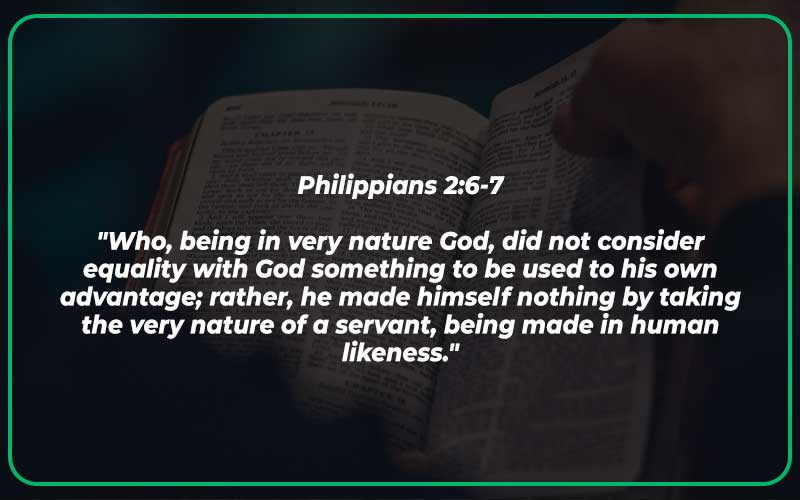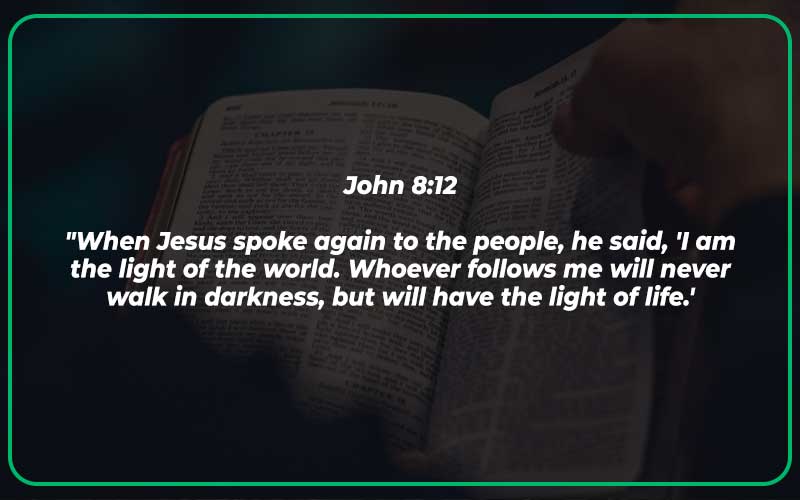As the year draws to a close, a palpable sense of joy and anticipation fills the air. Streets are adorned with twinkling lights, homes are decked with festive ornaments, and the sweet scent of freshly baked treats wafts through the neighborhoods.
It is a time when families come together, strangers exchange smiles, and a magical atmosphere envelops the world. Yes, it’s the season of Christmas—a time to celebrate the birth of Jesus Christ and reflect on the profound significance of this momentous occasion.
Amidst the bustling preparations and merry festivities, it is easy to get caught up in the secular trappings of the holiday season. However, for millions around the globe, Christmas is not just a time for exchanging gifts or indulging in delicious feasts. It is an opportunity to reconnect with our faith, embrace the timeless wisdom of the Holy Bible, and rediscover the true essence of Christmas.
Today, we embark on a journey through the sacred pages of Scripture, unearthing Bible verses that encapsulate the spirit of Christmas. These verses not only tell the story of Christ’s birth but also offer profound insights, guiding us towards love, hope, and compassion during this special time of year.
Join us as we delve into the heartwarming messages of the Bible, unraveling the rich tapestry of Christmas traditions that find their roots in ancient wisdom.
Whether you are a devout Christian seeking to deepen your understanding of this holy season or simply curious about the biblical significance behind Christmas, this exploration promises to illuminate your spirit and fill your heart with awe and wonder.
So, let us embark on this enlightening journey, discovering the Bible verses that paint a vivid portrait of the first Christmas and reveal the everlasting truths that continue to shape our celebrations today.
Also Read: Bible Verses About A New Day
Bible Verses About Christmas
Isaiah 9:6
“For to us a child is born, to us a son is given, and the government will be on his shoulders. And he will be called Wonderful Counselor, Mighty God, Everlasting Father, Prince of Peace.”
This verse describes the prophesied birth of Jesus, who brings peace and salvation to all who believe in him. It also highlights his divine nature as the Mighty God and Everlasting Father.
Matthew 1:23
“The virgin will conceive and give birth to a son, and they will call him Immanuel” (which means “God with us”).
This verse confirms the fulfillment of the Old Testament prophecy that a virgin would give birth to the Savior. It also emphasizes the presence of God among his people through the birth of Jesus.
John 1:14
“The Word became flesh and made his dwelling among us. We have seen his glory, the glory of the one and only Son, who came from the Father, full of grace and truth.”
This verse highlights the incarnation of Jesus, who became a human being and lived among us. It emphasizes the glory of his divine nature and his role as the full embodiment of grace and truth.
Luke 2:11
“Today in the town of David a Savior has been born to you; he is the Messiah, the Lord.”
This verse announces the birth of Jesus as the long-awaited Messiah, who brings salvation to all who believe in him. It emphasizes his lordship and authority over all creation.
Matthew 2:10-11
“When they saw the star, they rejoiced exceedingly with great joy. And going into the house, they saw the child with Mary his mother, and they fell down and worshiped him. Then, opening their treasures, they offered him gifts, gold and frankincense and myrrh.”
This verse depicts the wise men’s worship and adoration of the newborn Jesus, recognizing him as the long-awaited king. It also emphasizes the significance of the gifts they brought, symbolizing his role as a king, priest, and sacrifice.
Galatians 4:4-5
“But when the set time had fully come, God sent his Son, born of a woman, born under the law, to redeem those under the law, that we might receive adoption to sonship.”
This verse highlights the divine timing of Jesus’ birth, which was planned by God to fulfill his redemptive plan. It emphasizes his role as the Son of God and the means by which believers are adopted into his family.
Philippians 2:6-7
“Who, being in very nature God, did not consider equality with God something to be used to his own advantage; rather, he made himself nothing by taking the very nature of a servant, being made in human likeness.”
This verse emphasizes the humility of Jesus, who emptied himself of his divine privileges to become a human being. It highlights his willingness to serve others and his obedience to the Father’s will.

Hebrews 1:1-2
“In the past God spoke to our ancestors through the prophets at many times and in various ways, but in these last days he has spoken to us by his Son, whom he appointed heir of all things, and through whom also he made the universe.”
This verse emphasizes the preeminence of Jesus over all creation, as the one through whom God has spoken and the one who inherits all things. It highlights his divinity and his role in creation and redemption.
1 John 4:9-10
“This is how God showed his love among us: He sent his one and only Son into the world that we might live through him. This is love: not that we loved God, but that he loved us and sent his Son as an atoning sacrifice for our sins.”
This verse emphasizes the sacrificial love of God in sending his Son to die for the sins of humanity. It highlights the central message of Christmas, which is the love of God demonstrated through the birth, life, death, and resurrection of Jesus.
Luke 1:46-47
“And Mary said:
‘My soul glorifies the Lord
and my spirit rejoices in God my Savior,
for he has been mindful
of the humble state of his servant.'”
This verse highlights Mary’s personal response to the news of Jesus’ birth, as she praises God for his faithfulness and grace. It emphasizes the humility of Mary and her willingness to submit to God’s plan.
Matthew 1:21
“She will give birth to a son, and you are to give him the name Jesus, because he will save his people from their sins.”
This verse announces the purpose of Jesus’ coming, which is to save his people from their sins. It emphasizes the significance of his name, which means “the Lord saves.”
Isaiah 7:14
“Therefore the Lord himself will give you a sign: The virgin will conceive and give birth to a son, and will call him Immanuel.”
This verse prophesies the miraculous birth of Jesus to a virgin, emphasizing his divine origin. It also highlights the significance of his name, which means “God with us.”
Micah 5:2
“But you, Bethlehem Ephrathah, though you are small among the clans of Judah, out of you will come for me one who will be ruler over Israel, whose origins are from of old, from ancient times.”
This verse prophesies the location and origin of the Messiah, who will come from the small town of Bethlehem and whose origins are from ancient times. It emphasizes his role as the ruler over Israel and the fulfillment of God’s promises.
John 3:16-17
“For God so loved the world that he gave his one and only Son, that whoever believes in him shall not perish but have eternal life. For God did not send his Son into the world to condemn the world, but to save the world through him.”
This verse highlights the love of God in sending his Son to save the world from sin and death. It emphasizes the importance of faith in Jesus as the means of eternal life and the absence of condemnation for those who believe.
Colossians 1:15-20
“The Son is the image of the invisible God, the firstborn over all creation. For in him all things were created: things in heaven and on earth, visible and invisible, whether thrones or powers or rulers or authorities; all things have been created through him and for him. He is before all things, and in him all things hold together. And he is the head of the body, the church; he is the beginning and the firstborn from among the dead, so that in everything he might have the supremacy. For God was pleased to have all his fullness dwell in him, and through him to reconcile to himself all things, whether things on earth or things in heaven, by making peace through his blood, shed on the cross.”
This passage emphasizes the supremacy of Jesus over all creation and his role in creation and redemption. It highlights his divine nature and his function as the head of the church and the reconciler of all things through his sacrifice on the cross.
2 Corinthians 9:15
“Thanks be to God for his indescribable gift!”
This verse expresses gratitude to God for the gift of his Son, emphasizing the incomprehensible nature of the gift. It highlights the awe and wonder of God’s love demonstrated through the birth of Jesus.
John 8:12
“When Jesus spoke again to the people, he said, ‘I am the light of the world. Whoever follows me will never walk in darkness, but will have the light of life.’
This verse emphasizes the identity of Jesus as the light of the world, who brings salvation and guidance to those who follow him. It highlights the importance of following him for eternal life and the absence of darkness.

What Does the Bible Say About Christmas?
The Bible does not explicitly mention the celebration of Christmas as we know it today. The birth of Jesus Christ is detailed in the Gospels of Matthew and Luke, but the specific date of December 25th and many of the associated traditions are not mentioned in the biblical narrative.
The Gospel of Matthew narrates the story of the Magi visiting the infant Jesus, while the Gospel of Luke provides details about the shepherds in the fields and the angels’ proclamation. These accounts emphasize the miraculous nature of Jesus’ birth and its significance for humanity.
While the Bible doesn’t prescribe the observance of Christmas, the holiday has become a central part of the Christian tradition, commemorating the incarnation of Jesus Christ.
We see it as an opportunity for joy, reflection, and expressions of love and generosity. It’s essential for us to approach Christmas with a focus on the biblical themes of hope, peace, love, and the redemptive message of Jesus’ birth.

